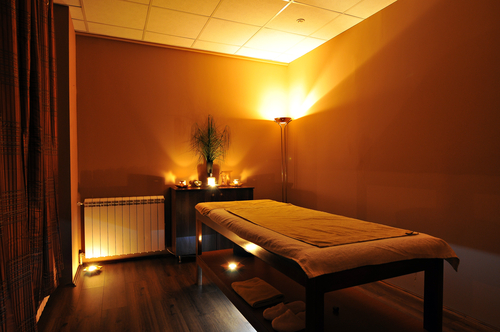I’ve had maybe 20 massages of various kinds over the course of my life. I never liked them much. I look at them as akin to taking cod liver oil. They’re supposed to be good for you, and the Lord knows sitting in front of a laptop for hours does nothing to improve my aging body.
Recently, though, on the recommendation of a friend, I booked an appointment with a guy I’ll call Viktor.
He greeted me nicely enough. His studio rocked the usual dim lighting (provided by a row of plug-in “candles”), tuneless faux-sitar Muzak, and the scent of chemical floral-musk.
He asked what I wanted and I laughed, “Can you just fix my entire being?” Then I said I was a writer and spent a lot of time sitting, so my neck, shoulders, and back could probably use attention.
I lay face down as he pressed, poked, and smoothed. I thought things were going along great. I didn’t think of much of anything — though I do have an unfortunate tendency when at the dentist’s, doctor’s, or massage studio to think of the people who were the victims of Dr. Mengele’s medical experiments under the Nazis.
So I started a rosary: Tuesday, the Sorrowful Mysteries, The Agony in the Garden…
After a while Viktor started working on my right arm. Neither of us had said a word thus far. And suddenly, he barked, “Relax! Let your arm go limp! You’re totally rigid. NOODLE UP!”
I shrank back, thinking, how can I relax when you’re criticizing me! Plus to my mind, I had been relaxing. I felt like saying, You should see me when I’m nervous.
Instead, I said “Oh sorry! OK.” And then I tried as hard as I could to relax.
The thing is I sincerely want to help. So I’m always super aware of the other person. What do they want? How can I make it easier for them? This requires such a concerted effort — in my mind, toward generosity, pulling my own weight, going the extra mile — that maybe I’m just making it harder for everyone, not to mention myself!
Eventually the guy finished up and I got dressed and went out to pay him. “So what’s the diagnosis?” I chirped.
Viktor lounged back in his chair and said, in a not entirely friendly way, “Well, your muscle tone is good. I don’t see any major areas of trouble. But — am I right in thinking you’re high-strung?”
I stifled a guffaw and he continued: “Because you’re completely unable to relax. Your whole body was contracted the whole time. It’s probably from decades of conditioning, but no massage therapist can really get in there and help you under those conditions. There’s just nothing to work with.”
For some reason, this made me burst into laughter. In my perverse way, I felt strangely proud. “I pray for an hour or two every morning!” I told him. “I take a long walk every day. Can you imagine what I’d be like if I didn’t do that stuff?”
I refrained from mentioning the daily Masses, the nightly examen, the retreats, the spiritual reading and writing.
Back in my car, I chuckled some more. High-strung? I wrote the book. Unable to relax? Duh. Why do you think I drank myself into oblivion every night for 20 years? You’d be nervous, too, if you had my brain. And for your information, I deserve a freaking medal for getting up and dressing every day, never mind trying to exercise a little “self-care” by booking a massage.
But as I drove home I realized the guy’s remarks bothered me, too. What would I be like if I didn’t basically devote my life to regulating my nervous system to the point where I can function each day?
Basically he’d corroborated what I’d always known: I’m in constant emotional and spiritual pain. Isn’t everybody? I’d always assumed.
Maybe — maybe not. I think it’s best to assume they are.
To that end, is it “unfortunate” to think of the victims of Mengele on the massage table? Or is it an effort to offer up my own pain in solidarity with those who are also suffering, or have suffered, or will suffer?
Well, that’s the thing. We’ll never know. The fruit of prayer isn’t that we become calm. The fruit of prayer is that, whatever our makeup, temperament, history, genetics, and wounds, we grow in love.
Suddenly, I thought of a passage from G.K. Chesterton’s “Orthodoxy” about the difference between Eastern and Western religious art:
“No two ideals could be more opposite than a Christian saint in a Gothic cathedral and a Buddhist saint in a Chinese temple. … The Buddhist saint always has his eyes shut, while the Christian saint always has them very wide open. The Buddhist saint has a sleek and harmonious body, but his eyes are heavy and sealed with sleep. The medieval saint’s body is wasted to its crazy bones, but his eyes are frightfully alive. … The Buddhist is looking with a peculiar intentness inwards. The Christian is staring with a frantic intentness outwards.”
Pulling into my garage, I burst out laughing once again.
“I’m waiting for the Second Coming!” I should have told Viktor.
“I’m not nervous — I’m just excited.”

